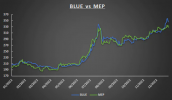nikad
Registered
- Joined
- Aug 10, 2006
- Messages
- 5,001
- Likes
- 4,795
The bottom line is that 22% of the people are ok, and almost 80% are scraping by. I don't feel I have the ability to explain how Argentina, the country with the largest middle class in South America ended up like this, I am sure there are multiple factors, but to say that it was the Ks or Macri's fault exclusively is at the very least naive. It takes more than 12 years to drive a country into the ground. If things were to rebound, it will take several decades for people to see any real benefits. When I say " people " I mean the majority ( ie over 50/60 % of the population )

